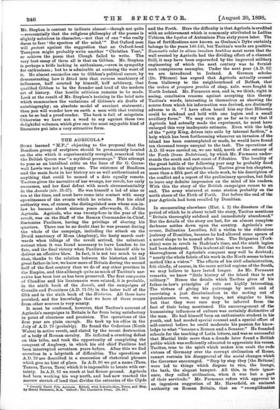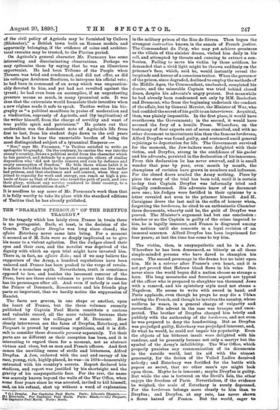THE AGRICOLA.* SontE learned " M.P.," objecting to the proposal
that the Boadicea group of sculpture should be permanently located on the site which it experimentally occupied, remarked that the British Queen was "a mythical personage." This attempt to pose as an histoiical critic on the lines of Sir G. Come- wall Lewis was not a happy one. The existence of Boadicea and the main facts in her history are as well authenticated as anything that could be named of a date equally remote. Tacitus gives the narrative of her wrongs, her revolt, her early successes, and her final defeat with much circumstantiality in the Annals (xiv. 31-37). He was himself a lad of nine or ten at the time, and must have come into contact with many eyewitnesses of the events which he relates. But his chief authority was, of course, the distinguished man whose son-in- law he became about sixteen years afterwards, G. Julius Agricola. Agricola, who was twenty-four in the year of the revolt, was on the Staff of the Roman Commander-in-Chief, Suetonins Paulinus, having the privilege of sharing his quarters. There can be no doubt that he was present during the whole of the campaign, including the attack on the Druid sanctuary of Mona (Anglesey), the hasty march east- wards when tidings of the revolt arrived, the reluctant retreat when it was found necessary to leave London to its fate, and the final victory when Paulinus felt himself able to deliver an effective blow. In fact, it is not too much to say that, thanks to the relation between the historian and his great father-in-law, we know more of Britain during the second half of the first century than we do of any other province in the Empire, and this although quite as much of Tacitus's nar- rative has been lost as has been preserved. The first conquests of Claudius and his lieutenants were related, it is probable, in the ninth book of the Annals, and the campaigns of Oerealis and Frontinns (A.D. 71-78) in the latter half of the .fifth and in the sixth book of the Histories. All these have perished, and the knowledge that we have of these events from other sources is very scanty.
It must be confessed, however, that Tacitus's account of Agricola's campaigns in Britain is far from being satisfactory in point of clearness and precision. The operations of the first year are plain enough. He took up his office in the July of A.D. 78 (probably). He found the Ordovices (North Wales) in active revolt, and elated by the recent destruction of a body of Roman cavalry. He inflicted a crushing defeat on this tribe, and took the opportunity of completing the conquest of Anglesey, in which his old chief Paulinus had been interrupted seventeen years before. After this we find Ourselves in a labyrinth of difficulties. The operations of A.D. 79 are described in a succession of rhetorical phrases which give no hint of place. In A.D. 80 we get a name (Tans, Tanana, Tavus, Tava) which it is impossible to locate with cer- tainty. In A.D. 81 we reach at last firmer ground. Agricola had been working his way north, and had now reached the narrow stretch of land that divides the estuaries of the Clyde • Cornslii Taciti Vita Agricola. Edited. with Introduction, Notes, and Map, by Henry Furman.; LA. Oxford; The Clarendon Press. Ns. dd-1
and the Forth. Here the difficulty is that Agricola is credited with an achievement which is commonly attributed to Lollies Urbicns, the legatus of Antoninus Pins sixty years later. The line of fortifications now known as Graham's Dyke certainly belongs to the years 140-145, but Tacitus's words are positive Summotis velut in alien insulam hostibus must mean that the wall erected by Agricola had the dividing effect of a channel Still, it may have been superseded by the improved military engineering of which the next century was to furnish such conspicuous examples. Under the next year (A.D. 821 we are introduced to Ireland. A German scholai (Dr. Pfitzner) has argued that Agricola actually crossed from Galloway to the neighbourhood of Belfast, that the crebra et prospera proelia of chap. xxiv. were fought in North Ireland. Mr. Furneaux sees, and is, we think, right in seeing, conclusive reasons against accepting this theory. Tacitus's words, interesting in themselves as showing the source from which his information was derived, are distinctly adverse to it. "I have often heard him say that Hibernia could be subdued and held with one legion and a small auxiliary force." We may even go as far as to say that if Agricola had actually made the experiment, he must have enlarged this very inadequate estimate. Even with the help of the "petty King, driven into exile by internal faction," a help which has been forthcoming whenever an invasion of the island has been contemplated or made, he would have found ten thousand troops unequal to the task. The operations of A.D. 83 were carried on, we are told, north of the estuary of the Forth (trans Bodotrium), by which Mr. Furneaux under- stands the south and east coast of Fifeshire. The locality of the great battle of the following year may be probably fixed somewhere in this neigbourhood. Tacitus gives ten chapters, more than a fifth part of the whole work, to his description of the conflict and a report of the preliminary speeches, but fails to leave any definite impression on the mind of his readers. With this the story of the British campaigns comes to an end. The army wintered at some station probably on the north shore of the Firth of Forth. But before the end of the year Agricola had been recalled by Domitian.
In enumerating elsewhere (Hist. i. 2) the disasters of the period of which he is about to.tell the story, Tacitus mentions "Britain thoroughly subdued and immediately abandoned." But the details of the story are lost, for an almost complete darkness settles down upon the country. Agricola's sue- cessor, Sallustius Lucullns, fell a victim to the ridiculous jealousy of Domitian, because he had allowed some spears of a novel shape to be named after him. The Brigantes (York- shire) were in revolt in Hadrian's time, and the ninth legion had been destroyed. This is about all that we know. But the thoroughness of Agricola's conquest may well be doubted; "nearly the whole fabric of his work in the North seems to have melted like a vision." The effects of his civil administration, felt chiefly, of course, in the more settled regions of the South, we may believe to have lasted longer. As Mr. Furneaux remarks, we know "little history of the island that is not military." Hence the details which Tacitus gives of his father-in-law's principles of rule are highly interesting. The virtues of giving his patronage by merit and of exercising a just discrimination in the meting out of punishments were, we may hope, not singular to him, but that they were rare may be inferred from the fact of their being mentioned. His encouragement of the humanising influences of culture was certainly distinctive of the man. He had himself been an enthusiastic student in his youth, and had needed special counsel and a special effort of self-control before he could moderate his passion for blow- ledge to what "became a Roman and a Senator." He founded schools for the teaching of Latin letters, and was so successful that Martial little more than a decade later found a British public which was sufficiently educated to appreciate his verses. Tacitus, true to the spirit which makes him exalt the rude virtues of Germany over the corrupt civilisation of Rome, cannot restrain his disapproval of the social changes which the Governor encouraged. "Step by step they [the Britons] were led to things which dispose to vice, the lounge, the bath, the elegant banquet. All this, in their ignor- ance, they called civilisation, when it was but a part of their servitude." Mr. Furneaux refers with approval to an ingenious suggestion of Mr. Haverfield, an eminent authority on Roman Britain, that an "exemplification of the civil policy of Agricola may be furnished by Calleva (Silchester)," a British town built on Roman models, and apparently belonging, if the evidence of coins and architec- tural remains may be trusted, to the Flavian period.
On Agricola's general character Mr. Farneanx has some interesting and discriminating observations. Perhaps we may epitomise them by saying that he was an illustrious opportunist. He had been Tribune of the People when Thraaea was tried and condemned, and did not offer, as did his colleague Arnlenus Rnsticus, to interpose his official veto ; he had been in command of an army which was unquestion- ably devoted to him, and yet had not revolted against the tyrant ; he had even been an accomplice, if an unprotesting presence means so much, in many tyrannical acts. It was thus that the extremists would formulate their invective when a new regime made it safe to speak. Tacitus writes his bio- graphy as "a political manifesto in praise of moderation and a vindication, expressly of Agricola, and (by implication) of the writer himself, from the charge of servility and want of true public spirit and patriotism." He points out that moderation was the dominant note of Agricola's life from first to last, from his stadent days down to the evil years when he had to bear the unenviable burden of being the most distinguished subject of a tyrannical Emperor :—
" Nor," says Mr. Furneaux, "is Tacitus satisfied to write an apologetic biography. On the contrary, be carries the war into the enemy's country, draws a political moral from the character which he has painted, and defends by a great example others of similar disposition who ' did not invite renown and ruin by defiance and empty assumption of freedom' He bids those whose habit it is to admire forbidden ideals to learn that great men can live under bad princes, and that obedience and self-control, when they are joined to capacity for work and energy, can reach as high a pin- nacle of fame as that of those who tread the path of peril, and owe their glory, without any service rendered to their country, to a theatrical and ostentatious death."
It is needless to say more of Mr. Furneaux's work than that it is fully worthy to take its place with the standard editions of Tacitus that he has already published.



































 Previous page
Previous page